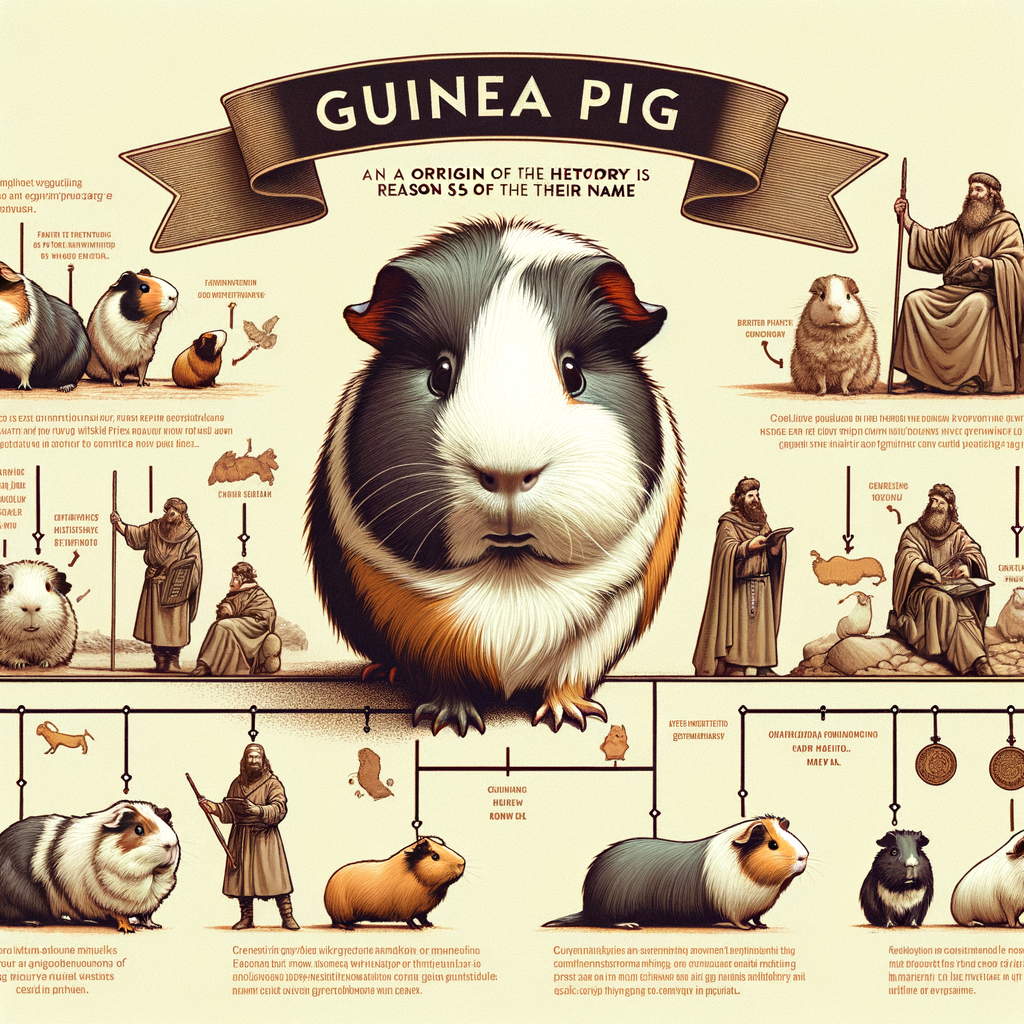
Introduction to Guinea Pigs
Guinea pigs, also known as cavies, are small, sociable, ‘chatty’ rodents that come in a variety of colors. They are native to South America and there are several different breeds, each with their own unique characteristics and traits. Let’s dive into the fascinating world of guinea pigs.
- Overview of Guinea Pigs
- Guinea Pigs as Pets
Guinea pigs are mammals, just like humans, which means they give birth to live young ones. They are herbivores, which means they eat plants. Their diet primarily consists of hay, fruits, and vegetables. Guinea pigs have a lifespan of about 4 to 8 years, but with proper care, they can live even longer.
Unlike other rodents, guinea pigs cannot produce Vitamin C on their own, so they need to get it from their diet. This is one of the reasons why it’s important to feed them a balanced diet that includes fresh fruits and vegetables.
Guinea pigs make wonderful pets for several reasons. They have a gentle and friendly nature which makes them great companions. They are also quite vocal and communicate using a variety of sounds such as squeals, chirps, and purrs.
Guinea pigs require a spacious cage with plenty of room to move around. They also need daily exercise outside their cage in a safe, enclosed area. They are social animals, so they enjoy the company of other guinea pigs. However, it’s important to ensure that any guinea pigs living together are of the same sex to prevent breeding.
Guinea pigs are also great for kids as they teach them responsibility. However, they should always be supervised when handling guinea pigs to ensure they are treated gently and with respect.
Guinea Pigs Name History
The history of the name ‘Guinea Pig’ is as fascinating as the creature itself. This name has been used for centuries and has a rich and interesting backstory. Let’s delve into the origins and evolution of this name.
Origin of the Name ‘Guinea Pig’
The name ‘Guinea Pig’ is a bit of a mystery. Despite what the name suggests, these adorable creatures are not pigs, nor are they from Guinea. So, how did they get this name? Let’s explore.
- Early references to the name
- Evolution of the name over time
The first known use of the term ‘Guinea Pig’ dates back to the 16th century. The English naturalist, John Ray, mentioned ‘Guinea Pigs’ in his writings in 1662. However, the name’s origin remains unclear. Some believe that the ‘Guinea’ part of the name may have been derived from ‘Guiana’, an area in South America. Others suggest that these animals might have been brought to Europe via Guinea, leading to the name.
Over time, the name ‘Guinea Pig’ has stuck, despite its inaccuracies. In many languages, the name for the Guinea Pig refers to pigs and foreign lands. For example, in German, it’s called ‘Meerschweinchen’, meaning ‘little sea pig’. This might be because when sailors brought them to Europe for the first time, they were transported over the sea.
Despite the confusion and mystery surrounding their name, one thing is clear: Guinea Pigs have captured the hearts of people all over the world, regardless of what they are called.
Why Guinea Pigs are called so
Ever wondered why guinea pigs are named as they are? It’s an interesting story that involves a bit of history and some theories. Let’s dive into it.
Guinea Pigs Naming Reason
The name ‘Guinea Pig’ is quite unique and it has sparked many theories over the years. Let’s explore some of the most popular ones.
- Theories about the ‘Guinea’ part of the name
- Theories about the ‘Pig’ part of the name
One theory suggests that the ‘Guinea’ in their name may have come from the Guinea region in West Africa. It’s believed that the guinea pigs were brought to Europe by traders who had been to this part of Africa. However, this theory is often disputed because guinea pigs are not native to Africa but to South America.
Another theory proposes that ‘Guinea’ was a term used in 16th and 17th century England to refer to any far-off, unknown country. So, when these cute little creatures were brought from South America, they might have been associated with this term.
Some people also believe that the term ‘Guinea’ might have been derived from ‘Guinea’ gold coins. These coins were worth one Guinea (21 shillings) in old British money. It’s speculated that the price of a guinea pig might have been one Guinea, hence the name.
The ‘Pig’ part of the name is thought to come from the guinea pig’s similar appearance and behavior to that of a pig. They have a stout body, no tail, and they love to eat. Just like pigs, they also make a similar kind of squealing noise.
Another theory suggests that the ‘Pig’ part of the name might have come from the German word ‘Meerschweinchen’, which means ‘little sea pig’. This term was used by Dutch and German sailors who would bring guinea pigs back from their voyages to South America.
Despite the many theories, the exact reason behind the name ‘Guinea Pig’ remains a mystery. But one thing is for sure, no matter what they’re called, these little creatures are loved by people all over the world for their adorable looks and friendly nature.
Guinea Pigs Name Explanation
Have you ever wondered why Guinea Pigs are called so? The name is quite intriguing, isn’t it? In this section, we will delve into the etymology of the name ‘Guinea Pig’ and unravel the mystery behind it.
Guinea Pigs Etymology
The name ‘Guinea Pig’ is a combination of two terms – ‘Guinea’ and ‘Pig’. Let’s explore each term separately to understand the origin and meaning.
- Explanation of the term ‘Guinea’
- Explanation of the term ‘Pig’
The term ‘Guinea’ in ‘Guinea Pig’ does not refer to the West African country, as one might think. The origin of this term in the context of Guinea Pigs is not entirely clear. Some theories suggest that the animals might have been brought to Europe by way of Guinea, leading to the name. Others believe it could be a distortion of the word ‘Guiana’, an area in South America. However, these are just theories, and the exact reason remains unknown.
The ‘Pig’ in ‘Guinea Pig’ is also a bit of a misnomer. Guinea Pigs are not pigs, nor are they related to pigs. They are, in fact, rodents. The term ‘Pig’ might have been used because of the similar sounds they make to pigs. Another theory suggests that their rounded bodies and large heads might have reminded people of pigs.
In conclusion, the name ‘Guinea Pig’ is quite a puzzle. It’s a combination of terms that don’t directly relate to the animal. But, it’s this unique name that adds to the charm of these adorable creatures.
Guinea Pigs Name Origin
Ever wondered why the adorable, small creatures we love to keep as pets are called ‘Guinea Pigs’? Despite their name, these animals are not pigs, nor are they from Guinea. Let’s delve into the fascinating history behind their name.
History of Guinea Pigs Name
The name ‘Guinea Pig’ has a rich history, filled with interesting facts and theories. Let’s explore this in more detail.
- Historical context of the name
- How the name spread globally
The name ‘Guinea Pig’ is believed to have originated from the 16th century when European traders brought these animals from South America. The ‘Guinea’ part of the name is thought to have come from ‘Guiana’, an area in South America. However, others believe it might have been a distortion of the word ‘Guinea’ in ‘Guinea Gold’, which was a term for a specific amount of money in England at the time. As for the ‘Pig’ part, it is likely due to the pig-like noises they make.
The name ‘Guinea Pig’ spread globally as these animals became popular pets around the world. European traders and explorers took them to different parts of the globe, and their unique name stuck. In many languages, the name for these creatures also refers to ‘pig’, further cementing the global use of ‘Guinea Pig’.
Despite the confusion and mystery surrounding their name, one thing is certain – Guinea Pigs have captured the hearts of people worldwide with their cute appearance and friendly nature. Whether you call them ‘Guinea Pigs’, ‘cavies’, or by any other name, these delightful creatures continue to be cherished pets in many homes.
Reason behind Guinea Pigs Name
The name ‘Guinea Pig’ has puzzled many people for centuries. Despite its name, this adorable creature is not a pig, nor does it originate from Guinea. So, why are they called Guinea Pigs? Let’s delve into the significance of their name.
Significance of Guinea Pigs Name
The name ‘Guinea Pig’ holds a unique cultural and scientific significance. It’s a blend of historical misconceptions, geographical confusion, and scientific taxonomy. Let’s explore these aspects in detail.
- Cultural significance of the name
- Scientific significance of the name
The term ‘Guinea Pig’ has a rich cultural history. The ‘Guinea’ part of the name is believed to be derived from ‘Guiana’, an area in South America where these creatures are native. However, over time, ‘Guiana’ was mispronounced and miswritten as ‘Guinea’. The ‘Pig’ part of the name is attributed to the pig-like noises these creatures make. Despite the confusion, the name ‘Guinea Pig’ has been widely accepted and used in various cultures around the world.
From a scientific perspective, the name ‘Guinea Pig’ is a part of the creature’s taxonomy. They belong to the family ‘Caviidae’ and their scientific name is ‘Cavia porcellus’, with ‘Cavia’ being Latin for ‘Guinea Pig’. The ‘porcellus’ part of the name means ‘little pig’ in Latin, further emphasizing the pig-like characteristics of these creatures.
In conclusion, the name ‘Guinea Pig’ is a fascinating blend of cultural history and scientific classification. It’s a testament to the creature’s unique characteristics and its place in our world.
Conclusion
-
In this article, we have taken a deep dive into the fascinating world of Guinea Pigs, specifically focusing on the origins and explanations behind their unique name. We started with an introduction to these adorable creatures, before delving into the history of their name. We explored why they are called ‘Guinea Pigs’, even though they are not from Guinea and are not pigs. We looked at various theories and explanations, each more intriguing than the last.
-
The mystery behind the name of Guinea Pigs is part of what makes them so interesting. While we may never know the exact reason, the theories we’ve discussed provide some plausible explanations. Whether it’s due to a misunderstanding of their origin, their pig-like appearance, or their price in Guinea, the name ‘Guinea Pig’ has stuck and is now recognized worldwide. In the end, regardless of their name, what matters most is that these creatures bring joy and companionship to those who care for them.







